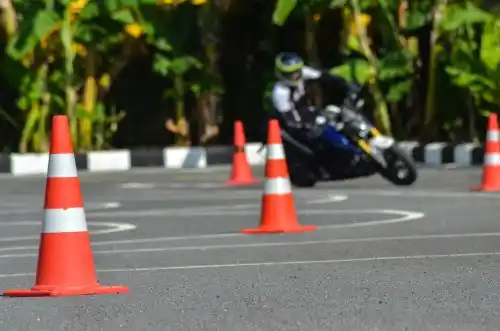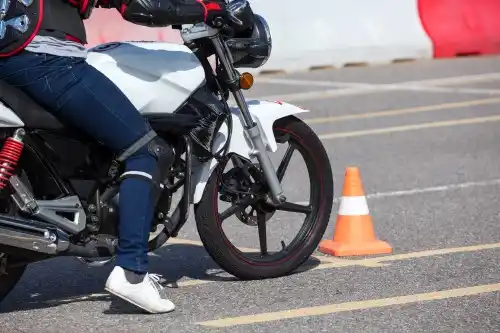Book motorcycle training in Ilminster, Somerset with any of the companies listed here
Click on any of the motorcycle training schools below to view more information and check availability.
Cycle Craft Motorcycle Training Taunton
Durston Elms, Taunton, Somerset, TA3 5AD
Approx. distance: 9.8 miles
Taunton and Exeter School Of Motorcycling
87 Eastleigh Road, Taunton, Somerset, TA1 2YE
Approx. distance: 9.8 miles
Morgan Motorcycle Training Somerset
Unit 1 & 2 Brympton Way, Lynx Trading Estate, Somerset, BA20 2HP
Approx. distance: 10.8 miles
East Devon Motorcycle Training
Doatshayne Farm, Devon, EX13 8AF
Approx. distance: 13.1 miles
Bransons Motorcycle Training Yeovil
22 Oxford Road, Yeovil, Somerset, BA21 5HR
Approx. distance: 13.5 miles
Sedgemoor Motorcycle Training Bridgwater
Bridgwater, Somerset, TA6 4WY
Approx. distance: 14.7 miles
Somerset and Mendip Motorcycle Training Wells
Milton Priory Estate, Wells, Somerset, BA5 1UA
Approx. distance: 22.2 miles
Avalon Motorcycle Training Weston Super Mare
BASC Sportsground, Stoddens Road, Burnham-on-Sea, Somerset, TA8 2BS
Approx. distance: 22.3 miles
On The Road Sturminster Newton
111 Rolls Mill Bridge, Sturminster Newton, Dorset, DT10 2HP
Approx. distance: 25.8 miles
MTS Rider Training Devon
Red One Ltd, Clyst St Mary, Exeter, Devon, EX5 1DJ
Approx. distance: 27.6 miles

Find motorcycle training in Ilminster, Somerset
If you are looking for motorcycle training in Ilminster then look no further! We have all the information here for you to find suitable motorcycle training and testing close to you or in the surrounding areas of South Petherton, Chard and Crewkerne.
What are the different types of motorcycle licence I can get in Ilminster?
There are 4 main types of full motorcycle licence issued by the DVSA. The first three (AM, A1 and A2 motorcycle licences) have restrictions on the type of moped or motorcycle you can ride, the fourth (the full A motorcycle licence) has no restrictions.
The AM restricted moped licence
The A1 restricted motorcycle licence
The minimum age to take this test is 17. According to the DVSA website it will allow you to ride a "Light motorcycle up to 11 kW (and a power-to-weight ratio not more than 0.1 kW per kg) and 125 cc". This means it's up to a 125 cc motorcycle with some restrictions to make sure it cannot accelerate too fast - a really good idea when you are new to riding a motorbike!
Requirements to take the A1 motorcycle test - You must have a UK provisional or full driving licence, a valid theory test certificate and a valid CBT certificate. Once you have taken this test you will not have to keep renewing your CBT certificate every 2 years, you can ride on motorways and you can take a pillion passenger on the back of your motorbike.
The A2 restricted motorcycle licence
For this licence you need to be at least 19 years of age, have completed your CBT or have had an A1 licence for at least 2 years. As with the A1 test you also need to have a UK provisional or full driving licence and a valid theory test certificate . The main benefit of getting an A2 licence is you can ride a more powerful motorcycle. The law states a "standard motorcycle up to 35 kW (and a power-to-weight ratio not more than 0.2 kW per kg)". So it's a more powerful bike, but still not completely un-restricted. To find A2 legal motorbikes you are best visiting your local motorcycle dealer and asking them to show you the A2 legal bikes, as otherwise it's very difficult to work out just looking at the tech specs.
The full A motorcycle licence, or DAS licence.
This is the licence that allows you to ride almost any motorcycle without restrictions, so it's the ultimate motorcycle licence. No limits on power outputs or power per kg or engine size! It is also called a 'DAS' licence as it can be obtained from the 'Direct AccesS' route. There are two ways you can get this licence:
1) If you are 24 or over you can take the tests for an A licence. You must also have a UK provisional or full driving licence, a valid theory test certificate and a valid CBT certificate.
2) If you are at least 21 years of age and you have held an A2 category licence for at least 2 years. This is sometimes referred to as the 'progressive access' route as you progress from one licence to another.
When taking the test the biggest difference is that you have to use a bigger, more powerful motorcycle. It will have a power of at least 40kw and an engine cc of at least 595 cc. Your local training school will make sure you have the right size bike for your test.
There is also a flowchart (click here) that the DVLA have produced that shows these different licences and how to obtain them.
To get more detailed guidance on what licence is right for you then talk to your local motorcycle training school. You can search for them here and they are qualified to speak to you on the right type of training for you.
What can I ride in Ilminster when I am 16?
When you are just 16 years of age your choices are more limited. There is a special category of licence called the 'AM' licence (derived from 'A' licence for 'M'opeds) that you can take when you are just 16 years old. You can of course, take it when you are older too, but it's the only full license available if you are under 17 years of age. You will still need to do all of the components of a full motorcycle test, namely your theory and hazard perception tests, your compulsory basic training (CBT), your module 1 off road test and your module 2 on road practical test.
This licence allows you to ride a moped of 50 cc or less which has a top speed of 28 mph, with a passenger and without Learner plates. If you are only interested in riding a moped and nothing more then this licence could be right for you. If you want to ride a more powerful motorcycle then you might find it better to wait until you are 17. From the age of 17 onwards you can take the A1 motorcycle test which allows you to ride motorcycle up to 125 cc and with some restrictions on its power to weight ratio.

How do I get the right training in Ilminster for the A1 motorcycle licence?
The A1 motorcycle licence is a restricted licence you can get when you are 17 or over. It is popular amongst 17 to 19 year olds as it is the only licence that allows you to get on a more powerful motorcycle at that age. It is essential that you get the right training for this licence as without it you are likely to hurt yourself or even worse, someone else. Use this website to enter your postcode and search for your local motorcycle training school. They are all fully qualified to advise you on the training you will need. Although saving money is something everyone wants to do, the right training will save your life. Therefore don't just focus on price, look at the quality of training on offer and the standard of training.
When can I take a pillion passenger on the back of my motorcycle?
In order to carry someone on the back of your motorbike you need to have a full motorcycle licence. This means one of the AM, A1, A2 or full A (also known as DAS) licences. This means that you cannot carry a pillion passenger if you only have a provisional licence, even if you have done a CBT. A CBT is not enough for you to take a pillion under any circumstances.
Even when you have passed your full motorcycle test you will need to make sure your motorcycle is properly equipped to take a pillion. As the rider you are legally responsible for your passenger, so it is very much in your interests to make sure your motorcycle is properly equipped. This means making sure there is a proper seat with foot rests and grab rail to hold on to. Your passenger must also wear a safety helmet (as well as all the other protective clothing!). Don't forget also that riding a motorcycle with a pillion is quite different than riding solo, so read up about the changes you need to make to your motorbike and riding style before attempting to take a pillion passenger.